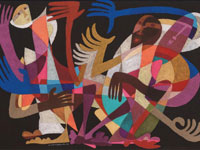|
Speakers Discuss Lived Experience of Black Americans, Explore Solutions to Inequities
 | |
APA’s Solomon Carter Fuller Award was established in 1969 to honor a Black citizen whose work has significantly improved the quality of life for the Black community. Since then, awardees have given lectures that often touch on some of the most significant issues impacting Black Americans.
Today, the Black community is still facing many of the same inequities that were discussed in years past, said Donna Norris, M.D., at APA’s Annual Meeting. A new anthology edited by Norris and Annelle Primm, M.D., M.P.H., and published by APA Publishing captures some of the ideas and perspectives presented during Solomon Carter Fuller Award lectures over the decades. Mental Health, Racism, and Contemporary Challenges of Being Black in America presents a cross-sectional examination of the most significant issues impacting the Black experience today and how they intersect with mental health.
During the session, Norris, who is also a contributor to the book, was joined by other chapter authors, including Primm and Loma K. Flowers, M.D. Another contributor, H. Westley Clark, M.D., J.D., M.P.H., an expert on substance use disorders (SUDs), was scheduled to speak, but he was not able to attend the session. Ayanna Jordan, M.D., Ph.D., spoke on SUDs among Black Americans in his stead.
Norris spoke about the efforts to minimize the Black experience in education. “I grew up in the 1950s and 1960s, and there was very little written on the history of African Americans in the books that were used in public classrooms,” she said. “They didn’t call it censorship, but there was no question that Black people were not there except as they were represented as slaves. So here we are, in 2024, and we’re now returning to an era that is again limiting the educational system.” Some states have passed laws limiting or banning diversity, equity, and inclusion (DEI) initiatives in higher education.
Jordan placed SUDs in the Black community within a historical context. “Drug policy in the U.S. health system is an example of how a system based on race affects Black American mental health and our understanding of addiction,” she said. She outlined how the war on drugs led to numerous social inequities for Black Americans, including overrepresentation in the criminal justice system and mass incarceration.
Flowers spoke about the framework of emotional competence and how to apply it to racism. She defined emotional competence as an extensive, comprehensive, and integrated set of social and emotional skills, which can enhance any individual’s ability to act constructively during everyday life events. Emotional competence provides skills to manage internal emotions and external interpersonal interactions. When individuals achieve emotional competence, they can act constructively and avoid self-destructive actions. These skills can be helpful for people engaging in racist behaviors, as well as the targets of racism and the witnesses.
In her chapter, Primm wrote about Black psychiatrists responding to the mental health impacts of natural and human-caused disasters. Racially marginalized and economically distressed communities often experience disproportionate levels of adversity following disasters, and even preceding disasters. Because they are living in substandard housing already and lack resources to evacuate, these communities often experience significant displacement and loss of lives, resulting in disruption to the social fabric, she said.
Primm convened the All Healers Mental Health Alliance in 2005 immediately after Hurricane Katrina. The multidisciplinary group facilitates culturally grounded responses to the mental health needs of historically marginalized communities affected by disasters, she explained.
“Typically, after disasters, communities of color are often bypassed and are the last to receive any resources,” she said. “This is a pattern that has been seen around the country, and it’s a pattern that our group seeks to change.” ■
|



